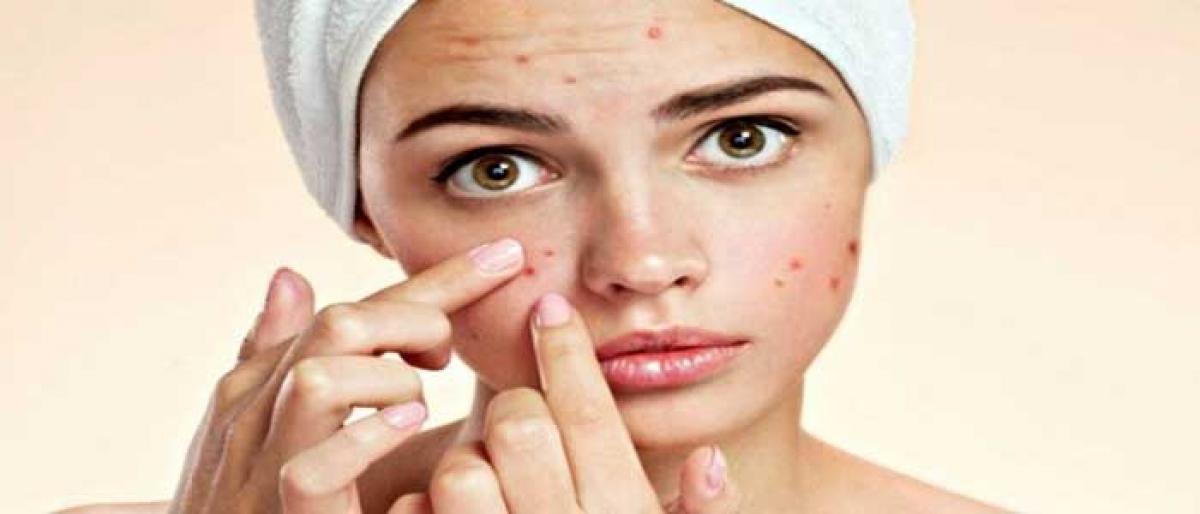Live
- Kamada Ekadashi 2024: Date, Auspicious Timings And Significance
- Aamir Khan’s son Junaid wraps up filming for his second movie
- Vijay Sethupathi’s heartwarming gesture wins netizens’ hearts
- Excitement builds as Nabha Natesh and Priyadarshi paired up
- Gurinder Chadha all set to make a comeback to big screen
- Palle Sindhura Reddy flays YS Jagan during election campaign in Puttaparthi
- KK Raju files nomination amid public celebrations and predicts victory with 45k vote majority
- Vijayawada Central Candidate Vellampally Srinivas Campaigns in 28th Division Railway Colony
- DCA busts three quack clinics in Hyd, Jangaon and Mahabubnagar
- Man threatens to jump into lake if he doesn’t get divorced from his wife
Just In

Meera, a 25-year-old marketing professional, was suffering from severe acne on her forehead. Embarrassed about the situation, she managed to hide these with makeup at her work place and social gatherings.
Acne and pimples are not just teenage problems, contrary to popular belief but can happen across a wide range of age groups
Meera, a 25-year-old marketing professional, was suffering from severe acne on her forehead. Embarrassed about the situation, she managed to hide these with makeup at her work place and social gatherings.
Fed up with her situation, she decided to dump all the previously used home remedies and visited a specialist for consultation.
Acne is one of the most common problems that affects both, men and women.
Not only teenagers, but, many adults suffer from acne. Multiple causative factors trigger acne. It affects the patient's self-confidence severely. It is important to not trigger the skin problems by using remedies at home and consult a specialist for immediate treatment. Also, for many people, recurring acne is a challenge.
What to expect in a consultation:
After examination, a specialist will design an overall programme that encompasses many smaller treatments that will work together in a synergistic manner. The examination generally includes overview of how long the patient have had the acne, what effective treatments they have tried in the past, whether they are starting to form acne scars or whether they have a family history of acne.
It is always better to use a combination of treatments that normalise the way the skin matures under the influence of hormones. The treatment method should also include treatment to break up any of the newly forming plugs, attack the bacterial presence in the area and address the inflammation.
Treatment to calm down the oil production in the patient’s skin should also be addressed on priority. Usually treatments can take place anywhere from once a week to once a month, with six to 10 sessions needed to get effective results. The mechanism of action is to interact with the oil glands in the skin and suppress oil production. During the treatment process, a patient needs to be calm and follow the prescribed treatment as it may take time for the results to be visible.
Lasers and peels can be used in combination to treat acne.
The experience of the dermatologist in treating acne and the extensive range of treatments that are now available have a significant positive impact on the quality of life for many acne sufferers.
Understanding acne
Acne is a complicated disease that is driven by both genetic and hormonal influences. Many teenagers suffer acne outbreaks as the body experiences hormonal changes during the adolescence period. The most common areas where people suffer from acne includes the face, chest, shoulders, and back as sebaceous glands, also known as oil glands are found in high concentrations in these areas.
Comedonal, papular, inflammatory/pustular, or nodulocystic comprise the common acne types.
Sometimes the skin cells in the pores stick together and form clumps. These are often known as comedones, or white-heads. If the material in the clump oxidizes and becomes dark, it leads to blackheads.
Bacteria in the skin migrate into areas where they use sebum, greasy or oily matter secreted by sebaceous glands leading to skin inflammation. Since there can be different components involved in the outbreak of acne in different people, it is important to get a consultation with a specialist to understand the reason
behind acne.
Do not self-treat acne
Everyone’s skin chemistry is different; hence, it is important that a certified dermatologist manages the treatment of complicated acne. Patients responses need to be monitored carefully and medicines need to be adjusted accordingly.
Since, medications can have side effects, it is important to balance the positive and negative to make sure that the benefits of acne therapy and the results outweigh the risks of treatment.
Some of the common side effects of acne treatment can be irritation, sun sensitivity, mild stomach upset, yeast infections and dry skin. Therefore, it is advisable to not self-treat acne and consult a specialist before the outbreak propagates.
By: Dr Sravya C Tipirneni
The writer is Consultant Dermatologist and Cosmetologist, Columbia Asia Hospital.

© 2024 Hyderabad Media House Limited/The Hans India. All rights reserved. Powered by hocalwire.com







